Ohio Lawmaker Equality Scorecard | Holding Our Elected Officials Accountable
Welcome | A Note from Equality Ohio Executive Director, Alana Jochum, Esq.
August 2022
Dear Voter,
Elections are always important. But this year, our election results could decide the fate of Ohio’s democracy for years to come. It is so important that LGBTQ+ Ohioans and the people who love them show up on November 8th and vote our values—both to ensure that fair-minded people get elected and to ensure that our democratic institutions can continue to rebuild.
Voting is never an individual action. It is an act of love for all Ohioans. Voting for people who will support—not harm—you or your loved ones is the best way to ensure our government reflects our values.
Our job at Equality Ohio is to watch what elected officials and candidates say and do so that you can be informed about how your leaders are leading. Holding our leaders accountable, whether they are running for re-election or not, is part of building both legal and lived equality for the most impacted among us.
This is the part where we need your help. You know the many anti-LGBTQ+ bills we are fighting at the state level, and you know that together, we have been able to hold the line. Help us keep holding that line by understanding who your candidates and elected leaders are, and keep holding them accountable to our values.
This year, we want you to pay special attention to the Ohio Supreme Court scorecard, as it is one of the most crucial elections of our time. As you’ll see, the Supreme Court is a vital branch of Ohio’s government that has the potential to weigh in on many issues impacting our democracy, voting rights, civil rights, and core issues directly affecting LGBTQ+ Ohioans.
Elected officials who support LGBTQ+ lived and legal equality—at all levels of government—are essential to both statewide and national equality. Look at your electeds at every level of government to see how their decisions accord with your values. It is often the decisions of these leaders that determine how we will achieve, and in some cases preserve, statewide and federal protections for us and future generations.
Thank you for supporting the work necessary to create a state where people are welcome, affirmed, and flourishing. We know this Ohio is possible when we work towards it—together.
In Solidarity,


Alana Jochum, Esq., Executive Director, Equality Ohio
Lawmaker Scores & Summary
Ohio’s Most Consequential Race | The Ohio Supreme Court Justice Candidates Scores
Please note: This scorecard is not an exhaustive list of Ohioans’ 2022 ballots. Additional local and state level offices and issues will be on your ballot, and we encourage you to look the candidates for those offices up before heading to the polls.
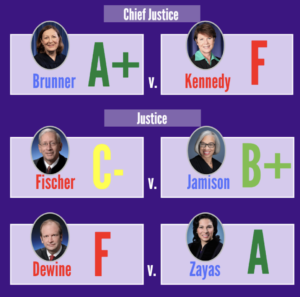
Race to Represent the State | Statewide Candidate Scores
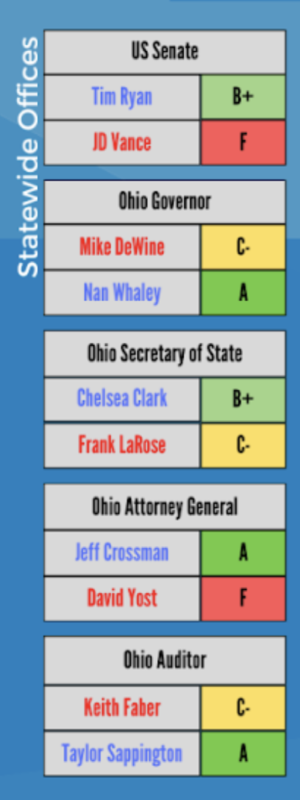
Session in Review | Ohio’s 134th General Assembly Scores
Read about how scores have been calculated, then find your lawmakers score below.
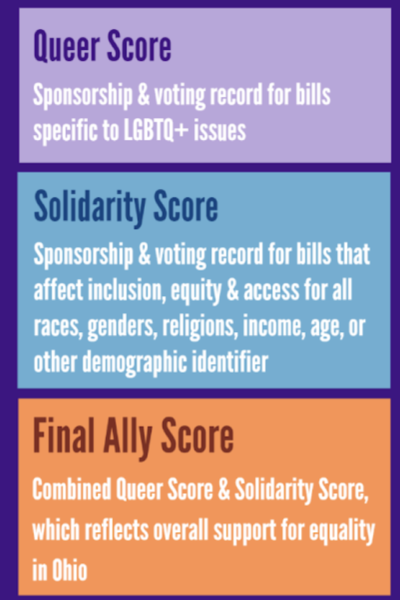
Look Up Your State Representative and Senator | Enter your address to see your representatives (This form does not save your information or sign you up for anything).

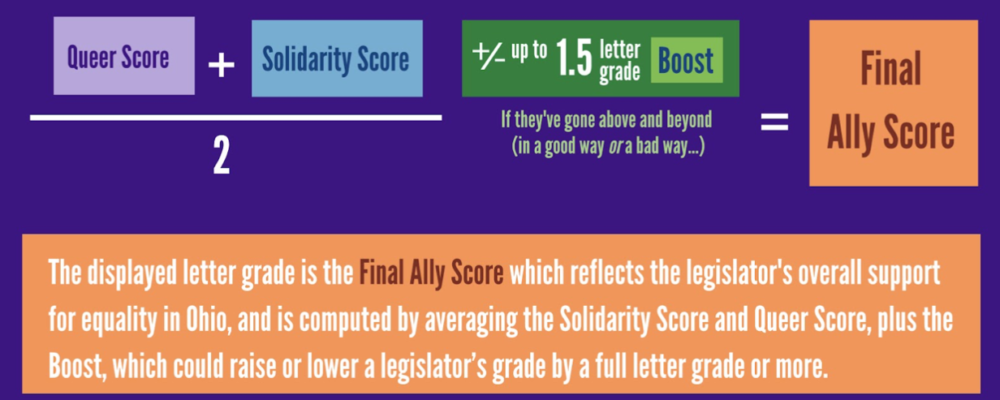
Ohio Senate | Lawmaker Scores

*No longer in office but served for a large majority of the 134th GA
Ohio House of Representatives | Lawmaker Scores



*Appointed mid-session and scored on fewer bills than other lawmakers
**No longer in office but served for a large majority of the 134th GA
Ohio Supreme Court Deep Dive
How Scoring Works | For Judicial candidates, we used slightly different criteria than the rest of Ohio’s elected offices. Along with respect for civil rights and general ethics, we looked for independence from partisan politics and consistency in judicial philosophy. Like the other statewide offices, we graded candidates on the totality of their career track records, including accomplishments, public statements, and campaign platforms, and we took into account both improvements or backsliding over time.
What We Looked For in Judicial Candidates | Character | Competency | Consistency in Judicial Philosophy | Respect for Civil Rights | Commitment to Transparency & Judicial Ethics | Judicial Independence from Partisan Politics
What’s At Stake | The Ohio Supreme Court is the top arbiter of Ohio’s state constitution and laws. Each is elected to a 6-year term. The state’s highest Court is an important check on the other branches of government.
Why It Matters | Two million cases go through our state court system yearly, and the Ohio Supreme Court will hear around 1,500 of them. Whether it’s ruling that the school funding formula is unconstitutional, or sending gerrymandered maps back to the Ohio Redistricting Commission, these seven Justices decide the fate of Ohio’s most consequential legal disputes.
Impact on LGBTQ+ Rights | The Ohio Supreme Court may hear cases that involve LGBTQ+ issues, litigants, and civil rights. It is important that we elect Justices who understand LGBTQ+ people, support LGBTQ+ equality, and are willing to uphold LGBTQ+ civil rights.
Types of Disputes the Ohio Supreme Court Decides:
-
The constitutionality of laws passed at the state and local level
-
Cases involving election disputes and redistricting
-
Questions of public or great general interest
-
Death penalty and other felony cases
-
Administrative agency appeals
How to Interpret Letter Grades:
A | Strong record & promising future in office
B | Mostly strong record or insufficient record but supportive campaign platform
C | Mixed record or insufficient record & unclear campaign platform
D | Mostly poor record or insufficient record but concerning campaign platform
F | Poor record & likely to harm civil rights in office
Chief Justice Candidates
The seat of Chief Justice on the Supreme Court of Ohio plays a vital leadership role in shaping the administration of justice in Ohio, as well as the practice of law in our state. The Chief Justice serves in many state leadership roles, is able to establish task forces to evaluate matters of public concern, sets priorities for the Court, issues interpretation guidance for Ohio laws and how the Ohio legal profession is governed, and weighs in on issues impacting those affected by our legal systems. For example, current Chief Justice Maureen O’Connor (R) has championed racial justice, bail reform, sentencing fairness, ensuring attorney representation for those experiencing poverty, transparency in courtrooms, access to accurate identification documents for transgender Ohioans, and other important reforms to Ohio’s legal system. Our next Chief Justice similarly must be willing to work to improve our legal system where it harms our most vulnerable Ohioans.
2022 Scorecard Summary | Final Scores

Jennifer Brunner | A+
Chief Justice Candidate

Justice Brunner has significant experience as a legal practitioner, elected official, and judge. She is presently serving her first term as a Justice of the Ohio Supreme Court.
Brunner was elected Ohio’s first female Secretary of State in 2006, holding the position for four years. She has served as a judge at the Common Pleas level and the Appellate level combined for more than a decade. In the years between serving in her various elected positions, Justice Brunner has practiced law in Ohio for 17 years.
Justice Brunner is a staunch and vocal supporter of the LGBTQ+ community, racial equity, and civil rights. At every stage of Brunner’s elected career, she has proven to be proactive in protecting the civil rights of every Ohioan. As just one example, as a Franklin County Common Pleas Judge, Brunner built an alternative court docket for people suffering addiction in 2004, long before alternatives to incarceration became a “high profile” policy reform.
Brunner proudly touts her strong, lengthy pro-equality record, including listing the Ohio Supreme Court’s role in providing a streamlined form for implementing gender marker changes for transgender Ohioans as a key accomplishment during her time on the bench. She has physically shown up for the LGBTQ+ community, appearing at Pride events and educating the LGBTQ+ community about the importance of the Supreme Court in Ohio. She served as the first ally Board Chair of The Legacy Fund of the Columbus Foundation, which is an endowment fund created by and for the central Ohio LGBTQ+ community.
As a current Justice of the Ohio Supreme Court, Brunner sided in favor of the bipartisan holding that Ohio’s redistricting maps were illegal gerrymanders, calling one of the maps “absurd on its face.” She named the ethical dilemmas that can arise in electoral politics, including in the redistricting situation: “The real takeaway from this four-year plan is that the Ohio Redistricting Commission should not be composed of people for whom the temptation may be too great to place political self-preservation above selfless service, regardless of party affiliation. What is needed in Ohio is an independent redistricting commission.”
Justice Brunner appears ready, willing, and able to take on the important leadership role of Chief Justice immediately. Tenants of her platform include continuing a Court focus on racial justice, bail reform, and accesss for transgender individuals to obtain birth certificates matching their gender identity. Brunner is also a vocal supporters of safe and legal access to abortion, and the right of “each individual’s right to make informed, independent decisions about sex, health, and family planning.”
She has promised to create a permanent Commission on Fairness and Equality in Ohio’s Courts; establish an Ohio Task Force on Environmental Justice; and expand support for a Criminal Sentencing Database. She has stated that she is “committed to examining our criminal justice system to identify and root out systemic racism so that people are treated fairly and equally in the state’s criminal justice system.”
Sharon Kennedy | F
Chief Justice Candidate
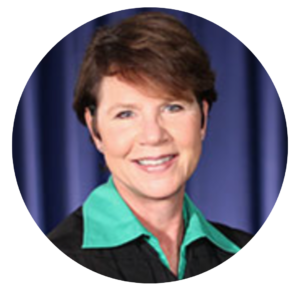
Justice Sharon Kennedy is presently serving in her second term as a Justice of the Ohio Supreme Court. She began her career within the justice system as a police officer for Hamilton Police Department. She later practiced law as a family law attorney before serving as a judge on the Butler County Court of Common Pleas, Domestic Relations Division for more than a decade.
Justice Kennedy has been vocal in her opposition to the issues impacting the LGBTQ+ community, including indicating—many times throughout her career—that she does not support nondiscrimination protections for LGBTQ+ Ohioans. She is staunch in her opposition to the right to abortion access, publicly indicating that the U.S. constitution does not include a right to abortion, and that an unborn child is “biologically human at every stage of his or her biological development, beginning at fertilization.”
Justice Kennedy’s handling of Ohio’s redistricting lawsuits is particularly troublesome. Not only would Kennedy have found the very skewed maps to be constitutional, she accused the majority of having “commandeered the redistricting process” for holding the Ohio Redistricting Commission to the standards explicitly outlined in Ohio’s constitution that was passed into law with overwhelming support from Ohio voters. She went as far as to argue that there was “no showing that partisan favoritism was the commission’s primary motivation.”
Her strong opinions in support of the Ohio Redistricting Commission’s gerrymandered maps and against abortion have also raised ethical questions at times over the course of Justice Kennedy’s tenure. For example, while the open redistricting cases were pending before Justice Kennedy and her colleagues on the Supreme Court of Ohio, she spoke in support of her candidacy for Chief Justice at a Republican Party event in Marion County indicating that the redistricting cases in her courtroom were “the fight of our life.” Similarly, in 2017, Kennedy gave a keynote speech at the Greater Toledo Right to Life’s legislative briefing breakfast soon after the Court agreed to review a 2014 case involving Toledo’s last surgical abortion center. She did not, however, recuse herself from the two abortion-related cases appearing before the Ohio Supreme Court that year, including the case from Toledo.
Justice Kennedy’s campaign website does not present a platform outlining her goals as Ohio’s next Chief Justice—a position that includes significant opportunity to shape Ohio’s judicial priorities, initiatives, and task forces. In her current Justice role, she has been vocal in her support of veterans, focusing energy on programs that educate sheriffs, judges, magistrates, and probation and parole officers about the treatment resources available to justice-involved veterans.
Justice Kennedy is presently endorsed by organizations that oppose LGBTQ+ equality and healthcare freedom, including Ohio Value Voters and Ohio Right to Life, among many others. She is also endorsed by the Buckeye Firearms Association and the Ohio Bail Agents Association.
As Chief Justice, Kennedy would have tremendous power in setting the agenda for the Ohio Supreme Court and shaping Ohio’s entire legal landscape. She has ignored important ethical considerations regarding the appearance of neutrality and has explicitly expressed opposition to LGBTQ+ equality and bodily autonomy, which raise serious concerns about how she would address LGBTQ+ rights in Ohio.
Fischer | C-
Seat 2 Candidate

Justice Fischer has served as an Ohio Supreme Court justice since 2017. He has stated that his judicial philosophy is to enforce the law as written, and he appears to care deeply about judicial ethics. Fischer previously served as the President of the Ohio State Bar Association and has worked closely with the Association on a variety of committees and task forces. As a private attorney, he served two terms on the Ohio Supreme Court’s Commission on Professionalism, including serving as vice chair. He also chaired the Cincinnati Bar Association’s ethics and professional responsibility committee.
Justice Fisher’s record on LGBTQ+ equality is limited. He has not vocally championed support for LGBTQ+ equality, nor has he made statements suggesting that he opposes LGBTQ+ equality. In an interview in 2016, he indicated that he would officiate a marriage for one of his gay friends if they asked him to do so.
Justice Fischer’s dissents in the Ohio Supreme Court’s redistricting cases make clear that his judicial ideology leans towards giving state legislatures nearly unlimited authority and jurisdiction of Ohio’s laws. He went so far as to accuse the majority that rejected the maps as illegal gerrymanders of “exercising authority not granted to this court by the Ohio Constitution.”
Justice Fisher appears to oppose the safe and legal access to abortion, publicly indicating that the U.S. constitution does not include a right to abortion, and that an unborn child is “biologically human at every stage of his or her biological development, beginning at fertilization.” Justice Fisher is endorsed by organizations opposed to abortion as well as the Buckeye Firearms Association.
Although Justice Fischer clearly values judicial ethics, his public stances against foundational civil rights, like voting and bodily autonomy, are worrisome. They raise concerns about how Justice Fisher would approach civil rights issues and issues impacting the LGBTQ+ community that may come before the Court.
Jamison | B+
Seat 2 Candidate

Judge Terri Jamison has served as a judge on the 10th District Court of Appeals since 2020. Previously, she served as a judge on the Franklin County Court of Common Pleas. Jamison began her career as an underground coal miner before moving to Columbus and eventually running her own insurance agency for 16 years. Upon entering the legal field, Jamison practiced law as a Franklin County Public Defender, as well as a solo practitioner before being elected to judge.
Judge Jamison has focused her energy as a judge on expanding alternatives to the detention of juveniles, as well as expanding access to justice, diversity, and inclusion within the judicial system. In speaking to the Federalist Society she once stated, “I look at the law from a very different perspective because I understand that the role of a judge is to give equal protection under the law. It is to give us the right to have equal rights in these United States.”
Jamison grew up in the coal mining country of Welch, WV and began her education in segregated schools. The Supreme Court case Brown v. Board of Education, which integrated public schools segregated by race, personally impacted her education.
Judge Jamison vocally supports many social justice initiatives, including affirmative action, police reform, raising the minimum wage, and gun control. That said, Judge Jamison has not vocally addressed issues facing the LGBTQ+ community, nor has she expressed opposition to the LGBTQ+ community.
Jamison has indicated support for the development and implementation of a Criminal Sentencing Database, a project supported by current Chief Justice Maureen O’Connor that is designed to assess and ensure fair and impartial treatment for all. Judge Jamison agrees that the 2022 Ohio legislative maps were illegal gerrymanders, and she is endorsed by organizations supporting the safe and legal access to abortion.
On the whole, Judge Jamison appears likely to be fair, impartial, and ethical in cases before her involving LGBTQ+ litigants or issues impacting the LGBTQ+ community.
Pat Dewine | F
Seat 1 Candidate

Justice Pat DeWine has served on the Ohio Supreme Court since 2017 and previously served as an elected judge at the common pleas and appellate levels. Prior to becoming a judge, he was a practicing attorney for a large law firm for 13 years.
Justice Pat DeWine has raised considerable ethics concerns during his tenure on the Ohio Supreme Court. Notably, he failed to recuse himself from the 7 redistricting cases that have come before the Supreme Court of Ohio even though his father, Governor Mike DeWine, was a named party. Justice DeWine’s father was directly before him in those cases as a member of the Redistricting Commission and was even subject to motions for contempt for violating the Court’s directives. DeWine has sided with his father and the rest of the Redistricting Commission in every related case that was brought before the Court. Justice DeWine proudly lists his dissent in these cases on his website under “Representative Decisions.”
With regard to LGBTQ+ equality, DeWine has not publicly indicated support for Ohio’s LGBTQ+ community and has instead suggested that laws protecting LGBTQ+ against discrimination are invalid. In 2016, DeWine indicated that he would likely find nondiscrimination laws that protect LGBTQ+ individuals in housing, employment, and public accommodations unconstitutional on the basis that they infringe on free speech and association rights. This is a significant and troubling signal, as Ohio presently has more than 35 local nondiscrimination protections in the absence of a uniform, statewide nondiscrimination law.
Justice DeWine has vocally opposed the safe and legal access to abortion, publicly indicating that the U.S. constitution does not include a right to abortion and that an unborn child is “biologically human at every stage of his or her biological development, beginning at fertilization.” Justice DeWine is endorsed by organizations opposed to abortion and the Buckeye Firearms Association.
Justice DeWine has ignored important ethical considerations regarding the appearance of neutrality and has explicitly expressed opposition to LGBTQ+ equality and bodily autonomy, which raises serious concerns about how he would address LGBTQ+ rights in Ohio.
Marilyn Zayas | A
Seat 1 Candidate

Judge Marilyn Zayas is the first Latina elected to an Ohio Court of Appeals. She has served on Ohio’s First District Court of Appeals since 2016. Prior to becoming a judge, Zayas practiced law for nearly twenty years and has practiced in a variety of different settings ranging from large firm practice to solo practice, and covering a wide range of practice areas. While serving on the First District, Zayas was invited by Chief Justice O’Connor to sit on the Ohio Supreme Court by designation to hear a case when a fellow Justice recused themself from a case before the Court.
Judge Zayas has focused energy as a judge on inspiring the next generation of students to understand the court system and consider a path in law through her “Educating Tomorrow’s Leaders” program. She also has focused on victim advocacy efforts, partnering with law enforcement agencies in order to support best practices such that foreign born victims feel safe and empowered to report crimes and interact with the justice system.
Zayas is supportive of the LGBTQ+ community and highlighted young leaders in the Ohio LGBTQ+ community for pride month. Zayas has indicated support for bail reform, the development and implementation of a Criminal Sentencing Database, a project supported by current Chief Justice Maureen O’Connor that is designed to assess and ensure fair and impartial treatment for all, agrees that the 2022 Ohio legislative maps were illegal gerrymanders, and is endorsed by organizations supporting the safe and legal access to abortion.
Judge Zayas is adamant about overcoming systemic biases in our criminal justice system. As an Ohio Supreme Court Justice, she will likely be a reliable voice in favor of civil rights and ensuring our legal system is fair and equitable.
Statewide Offices Deep Dive
How Scoring Statewide Candidates Works | For executive office candidates, unlike the General Assembly scores, we graded candidates on the totality of their career track records, including accomplishments, public statements, and campaign platforms, and we took into account both improvements or backsliding over time.
What We Looked For in Statewide Candidates | Character | Competency | Support for Civil Rights Promises and Accomplishments Related to Diversity, Equity & Inclusion | Commitment to Transparency & Ethics
How to Interpret Letter Grades:
A | Strong record & promising future in office
B | Mostly strong record or insufficient record but supportive campaign platform
C | Mixed record or insufficient record & unclear campaign platform
D | Mostly poor record or insufficient record but concerning campaign platform
F | Poor record & likely to harm civil rights in office
U.S. Senate
Tim Ryan | B+

Tim Ryan has been a Youngstown-area Congressman since 2003 and is a cosponsor of the Equality Act, which would explicitly codify protecting LGBTQ+ Americans against discrimination. He promises to support judicial candidates who believe in equal protections for LGBTQ+ people and to protect LGBTQ+ people in the military. Ryan is best known for being a strong advocate of workers’ rights.
Ryan made a few unfortunate campaign choices, including alienating Asian Americans in political ads, undermining racial justice advocates’ police reform efforts, and making a false equivalency between people fighting for civil rights and the people attacking them.
Campaign tactics aside, Ryan has a strong voting record on civil rights issues. We hope that as a Senator, Ryan will be proactive in protecting the legal and lived equality for all, and will take the priorities of marginalized communities seriously.
JD Vance | F

JD Vance has never held public office prior to running for this U.S. Senate seat. Vance’s resume includes working at a corporate law firm, then running billionaire Peter Theil’s venture capital firm in San Francisco (note, Theil spent more than $15 million in support of Vance’s candidacy before June 2022). Vance is most well known for writing “Hillbilly Elegy”, a book about his upbringing in a Cincinnati suburb and his grandparents’ hometown in Appalachian Kentucky.
Vance moved back to Ohio in 2017, and his public image evolved significantly. He moved away from his initial, measured response to Trump’s candidacy and has instead become Trump’s champion and endorsed candidate. He has fully embraced a fringe, rightwing, anti-LGBTQ+ ideology.
Vance’s campaign has been filled with dangerous rhetoric equating LGBTQ+ people to “groomers”, and arguing that any discussion of systemic racism, accurate and honest history or racial equity should be banned.
We hope that as a Senator, Vance would appreciate the gravity of that position of power and begin to take cues from Ohioans—rather than billionaires outside of our state—and work to protect all Ohioans against bigotry and discrimination.
Ohio Auditor
Keith Faber | C-

Keith Faber has served as Ohio’s Auditor since 2019. As Auditor, Faber is a member of the 7-person Ohio Redistricting Commission, a body that is crucial to preserving democracy in Ohio.
We appreciate that Faber did not join the rest of his party in voting to implement the unconstitutional maps every time, and that he stood alone among his colleagues in doing so. However, his reasoning for voting against (some of) the maps was that they were gerrymandered against Republicans—an assertion that lacks merit and appears to be grounded in partisanship politics instead of voter interests.
Faber has been consistently opposed to voter protection measures, including opposing the ballot initiatives to reform the redistricting process that created the very Ohio Redistricting Commission he now serves upon.
Prior to serving as Ohio Auditor, Faber was the Ohio State Senate President and a State Representative. During his time as Senate President, Faber sponsored and supported several anti-choice bills. His record in terms of LGBTQ+ support is unclear, in that he has not vocally supported LGBTQ+ equality, nor has he vocally opposed it. Faber’s past Equality Ohio scorecard grades during his time at the statehouse illustrate significant room for growth for supporting LGBTQ+ equality.
Because the intersection between LGBTQ+ representation and the State Auditor is largely the Auditor’s role on the Ohio Redistricting Commission, our analysis focused most heavily on the candidate’s commitment to protecting democracy.
We hope that, as Auditor, Keith Faber will take his responsibility to Ohio voters seriously and engage in meaningful, nonpartisan negotiations during the next round of mapmaking. We also hope that he can express clear support for the LGBTQ+ Ohioans, whom he represents.
Taylor Sappington | A

Taylor Sappington has served as the Nelsonville City Auditor since 2019. He previously served as a Nelsonville City Councilperson and boasts a strong record on transparency and government accountability.
Sappington is the first openly gay statewide candidate for Ohio office and has been vocal about making LGBTQ+ equality a priority.
Sappington has been closely following the redistricting process in Ohio and has been consistently critical of the Ohio Redistricting Commission’s performance, specifically citing a lack of bipartisanship and transparency.
The State Auditor’s membership on the Ohio Redistricting Commission guarantees that Ohio’s next Auditor will play a key role in voting on the next round of district maps.
Because the intersection between LGBTQ+ representation and the State Auditor is largely the Auditor’s role on the Ohio Redistricting Commission, our analysis focused most heavily on the candidate’s commitment to protecting democracy.
We hope that as Ohio Auditor, Sappington will continue to fight for fair maps, transparency in the redistricting process, and genuine bipartisan collaboration.
Ohio Governor
Mike DeWine | C-

Mike DeWine has served as Ohio Governor since 2019. DeWine’s record as governor has some admirable accomplishments but also considerable blemishes. DeWine has illustrated a sincere evolution on supporting LGBTQ+ people, which is encouraging. Still, he has a troubling track record, including refusing to veto the “medical conscience clause” slipped into last year’s budget, which will harm LGBTQ+ people seeking medical care. He also fully opposes abortion, a procedure to which LGBTQ+ individuals need safe access.
DeWine also played a key role in Ohio’s redistricting drama, voting to implement unconstitutionally gerrymandered maps for US Congress, Ohio Senate, and Ohio House of Representatives.
To Governor DeWine’s credit, within minutes of taking office, he signed a nondiscrimination executive order protecting LGBTQ+ state employees, including transgender employees. This was an important, meaningful executive action in a state where LGBTQ+ Ohioans still do not have statewide nondiscrimination protections. He also has used his pulpit to advocate for investment in child services and strong mental health support for Ohio’s youth. He has publicly opposed the legislature seeking to ban transgender youth from playing sports.
Prior to serving as Governor, DeWine served as an Ohio State Senator, a U.S. Congressman, U.S. Senator, and Ohio Attorney General. As a U.S. Senator, DeWine sponsored the Federal Marriage Amendment to the US Constitution, which would have outlaw same-sex marriages. As Attorney General, DeWine opposed the Obergefell v. Hodges marriage equality case and sued to stop the implementation of the Affordable Care Act.
During his tenure as Governor, his positions on both of these issues appear to have softened based upon public comments and his expansion of medicaid in Ohio. We hope that as Governor, DeWine will continue to evolve towards valuing respect for civil rights and bodily autonomy.
Nan Whaley | A

Nan Whaley served as the mayor of Dayton, Ohio from 2013 to 2022. Whaley led the city during the period in which Dayton suffered two major tragedies—the devastating tornadoes, and the Dayton mass shooting, which has motivated her to fight hard for practical gun control and infrastructure investment. As mayor, Whaley has focused on economic development and revitalization, investment in early childhood education. Under Whaley’s leadership, Dayton consistently received the highest possible score on Human Rights Campaign’s Municipal Equality Index, which seeks to evaluate cities in their support for LGBTQ+ residents.
Whaley has run an unabashedly pro-equality campaign for governor, specifically making big promises to protect abortion access, civil rights, and LGBTQ+ equality.
Whaley has a robust list of campaign priorities that illustrate a strong commitment to diversity, equity, inclusion, and fairness. Gun safety, anti-corruption, jobs, prescription drug costs, and environmental protections are all priority issues for Whaley. Whaley is a vocal supporter of LGBTQ+ equality on social media, in campaign speeches, and in attendance at LGBTQ+ events.
We hope that as Governor, Whaley will continue to value equality and work to protect and enhance civil rights.
Ohio Attorney General
Dave Yost | F

Dave Yost has served as Ohio State Attorney General since 2019. While in office, Yost has amassed a lengthy record of harmful litigation against LGBTQ+ civil rights and public statements that alienate and, at times, even villainize our LGBTQ+ community.
Yost has sued three federal agencies in two anti-transgender lawsuits this year, both targeting Title IX nondiscrimination guidance. The first lawsuit went after the Department of Education and Equal Employment Opportunity Commission arguing schools should have the right to discriminate against transgender students. The second went after the Department of Agriculture’s free school lunch program, arguing that schools participating in the program should be allowed to discriminate. Both lawsuits are without legal merit and send a signal to transgender Ohioans that they are not worthy of basic protections. Yost also issued a Friend of the Court brief to the U.S. Supreme Court, arguing against LGBTQ+ workplace protections.
Yost also joined a lawsuit that pushed the Big Lie and attempted to overturn Pennsylvania’s election results in 2020. In addition, he is avidly anti-choice and has litigated and filed briefs in opposition to abortion access.
Prior to becoming Ohio Attorney General, he served as State Auditor, Delaware County Auditor, and Delaware County Prosecutor.
We were unable to locate a campaign website. It is our sincere hope that if Yost remains the Attorney General that he will be willing to meet with LGBTQ+ Ohioans to understand how these past actions have harmed the community and how he can take proactive steps to protect the community through his position of power instead.
Jeff Crossman | A

Jeff Crossman is a current Ohio State Representative who has served since 2019. This year, he earned an A- on Equality Ohio’s Lawmaker Scorecard for his voting record while in office, illustrating a strong commitment to legal and lived equality for all.
Prior to serving in the Ohio House of Representatives, Crossman was a Parma City Councilman. He has worked closely with the Hunger Network of Greater Cleveland and provides certain pro bono legal counsel in his community. He has been vocal on social media regarding his support of LGBTQ+ Ohioans and access to abortion.
As Attorney General, we hope that Crossman will honor his commitment to protecting civil rights and protecting Ohio from corruption.
Ohio Secretary of State
Chelsea Clark | B

Chelsea Clark has served as a Forest Park City Councilperson since 2017. She is also a small business owner. Emphasizing that she is a sixth generation farmer and a single mom, Clark indicates she was motivated to run for Secretary of State to protect democracy.
Clark was previously a financial analyst in Cincinnati and a teacher. She also started a nonprofit to support parents helping their children learn math and science.
Clark promises to protect voting rights, ensure all voters are counted, and protect the safety and security of our elections. She also promises to support small businesses.
Clark has given us every reason to believe she will value voting rights, democracy, and civil rights.
As someone who primarily worked in the private sector, limited public information is available regarding Clark’s specific professional accomplishments. Her “B” grade reflects a limited – but promising – public track record.
We hope that as Secretary of State, Clark will continue to prioritize voting rights and ballot access.
Frank LaRose | C-

Frank LaRose has served as Ohio’s Secretary of State since 2019. Prior to serving as Secretary of State, he served in the Ohio Senate.
LaRose’s record as Secretary of State has been disappointing to voter advocates and democracy protectors. He defended and continued the problematic voter purge process, and he voted to implement legislative maps that he himself acknowledged were drafted based on “asinine” reasoning. On the Ohio Redistricting Commission, LaRose voted to implement unconstitutionally gerrymandered maps for US Congress, Ohio Senate, and Ohio House of Representatives.
This is a disappointing shift for LaRose, who as a state legislator consistently showed up as a reliable leader for LGBTQ+ Ohioans. As a Senator, LaRose was a cosponsor of the Ohio Fairness Act for numerous years, and he has championed LGBTQ+ equality within his caucus and among his colleagues as a nonpartisan issue. We deeply appreciate this vocal support and hope it will continue; we must also account that his recent momentum away from voting rights and civil rights harms Ohioans, including LGBTQ+ Ohioans. We hope that as Secretary of State, LaRose will double down on the importance of election fairness and voter access, reject once and for all the Big Lie, and continue to vocally support LGBTQ+ Ohioans.
Session In Review: State Senate & House Scores
How Scoring State Lawmakers Works | Legislators’ records were reviewed based on voting records on consequential legislation during the 134th General Assembly.
Lawmakers final grade is a composite of 3 analyses:
- Queer Score: Sponsorship & Voting Record for LGBTQ+ Bills. (½ of baseline score)
- Solidarity Score: Sponsorship & Voting Record for Bills that affect inclusion, equity, & access for all regardless of race, gender, religion, income, age, or other demographic identifier. (½ of baseline score)
- Boost (if applicable): Noteworthy Public Statements & Actions Related to LGBTQ+ Issues. (optional +/- up to 1.5 Letter Grade)
Each lawmaker ends up with a letter grade in each category.
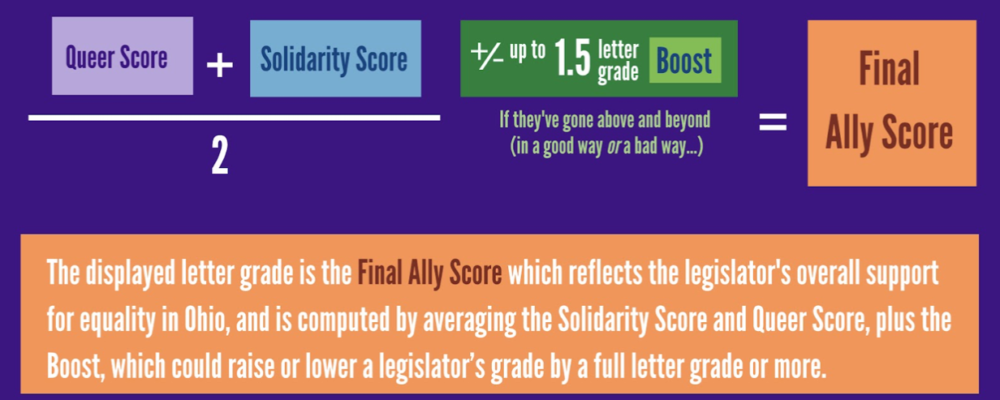
How to Interpret Letter Grades:
A | Consistent support for good bills & opposition to bad bills
B | Mostly consistent support for good bills & opposition to bad bills
C | Mixed voting record
D | Mostly consistent support for bad bills & opposition to good bills
F | Consistent support for bad bills and opposition to good bills
Ohio State Senate 2022 Scores
Ohio State House 2022 Scores
Statehouse Leaders When It Counted

Senator Nickie Antonio
(Dist. 23) is Ohio’s first openly LGBTQ+ legislator and has been a true champion for equality. She has sponsored the Ohio Fairness Act for over a decade and championed other affirming bills. She is pushing to modernize Ohio’s HIV laws to reflect advances made in HIV medical care and continues to promote smart legislation that respects civil rights for all.

Representative Michael Skindell
(Dist. 13) has been a vigilant defender of LGBTQ+ equality. He has sponsored the Ohio Fairness Act for over a decade, and when transgender youth were at risk of losing access to sports through a last-minute amendment to an unrelated bill, Skindell boldly protested right on the statehouse floor.

Representative Brett Hillyer
(Dist. 98) has been a consistently strong advocate for LGBTQ+ equality in Ohio. As a primary sponsor of the Ohio Fairness Act, Hillyer has led by example by using his pulpit through op-eds, public statements, one-on-one conversations with policy makers, and engagement with LGBTQ+ leaders to highlight the importance of bipartisan collaboration to build inclusivity in Ohio.

Representative (Dr. )Beth Liston
(Dist. 21) has been a fierce ally of transgender youth in committee hearings, on the House floor, and in the public sphere. Liston has gone toe-to-toe with people who push extremist anti-trans policies and has utilized her knowledge of science and medicine to make sure misinformation doesn’t go unchecked. Let’s just say, we’re glad there’s a doctor in the House.
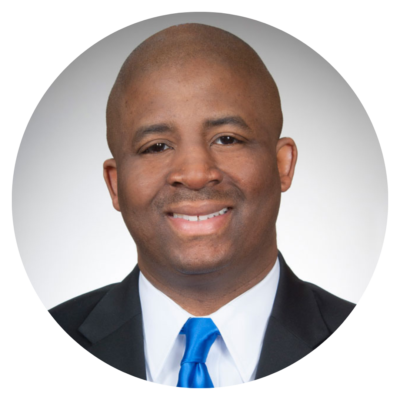
Representative Phil Robinson
(Dist. 6) has proven he is a reliable ally for LGBTQ+ Ohioans. More than once this session, Robinson spoke on the House floor to express unapologetic support for transgender youth athletes. Robinson has shown leadership by boldly standing up to fellow representatives who attempted to cram harmful, extreme anti-trans provisions into unrelated legislation.

Senator Matt Dolan
(Dist. 24) has been unwavering in his commitment to passing nondiscrimination protections for LGBTQ+ Ohioans. As a cosponsor of the Ohio Fairness Act, Dolan has insisted that the OFA is imperative for a thriving economy. Dolan knows what the majority of Ohioans know: protecting LGBTQ+ Ohioans is a nonpartisan goal.
SCORING LEGISLATION
What We Looked For in Legislation | Bill Evaluation Formula

These are bills and resolutions that are Equality Ohio priorities, bringing us to lived and legal equality.
Legislation | Good Bills
Good Queer Bills: These are bills that would disproportionately improve the lived or legal equality of LGBTQ+ Ohioans, or are responsive to the needs of LGBTQ+ Ohioans.
Graded Good Queer Bills

These are bills and resolutions that are Equality Ohio priorities to defeat, delay and ultimately prevent.
Legislation | Bad Bills
Bad Queer Bills: These are bills that would disproportionately harm the lived or legal equality of LGBTQ+ Ohioans, or negatively affect the needs of LGBTQ+ Ohioans.
Graded Bad Queer Bills

Legislation | Good Solidarity Bills
Good Solidarity Bills: These are bills that would improve the lived or legal equality of marginalized communities that intersect with queer identities.
Graded Good Solidarity Bills

Legislation | Bad Solidarity Bills
Bad Solidarity Bills: These are bills that attack a civil liberty or access to a survival service, or lead to disparate harm to marginalized communities.
Graded Bad Solidarity Bills
Legislation Scoring | Crunching the Numbers
Each Lawmaker receives a numerical score between -3 to 3 depending on how they engaged with good and bad legislation.
Scoring Good Bills

Scoring Bad Bills

Scoring Pending Bills
Bills that have been introduced but not voted on only count towards the scores for the bill sponsors, and do not affect the scores for all other general assembly members.
Scoring Committee Votes
Both committee votes and floor votes count as separate “bills scored”, so someone voting for/against a bill in both a committee and on the floor will have two bill scores, one for their committee vote and one for their floor vote.


Grade Scale

Calculating Final Ally Score
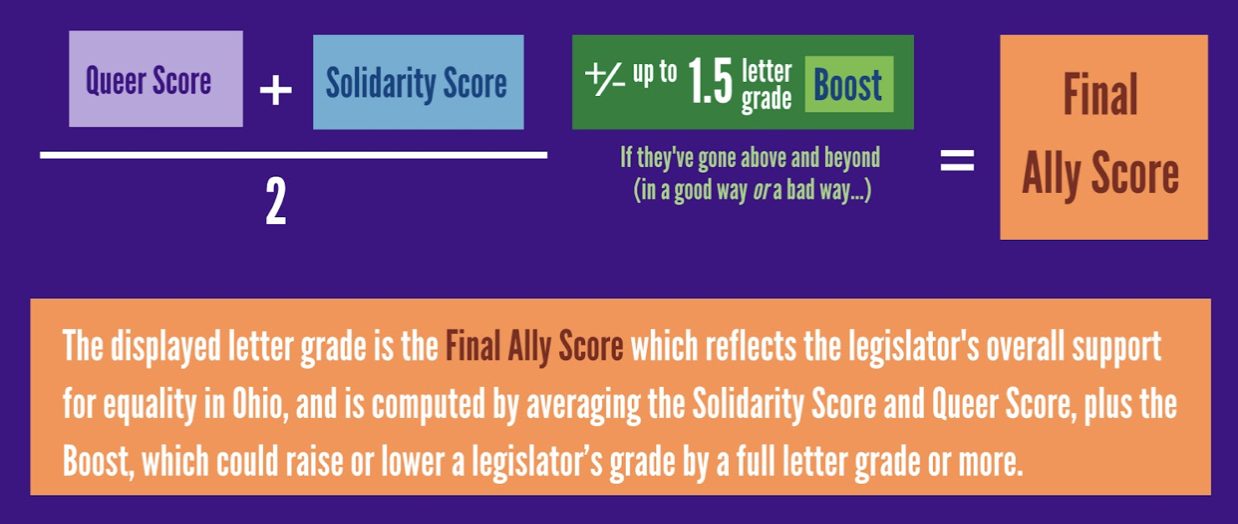
Additional Nonpartisan Voter Resources
- Visit Vote411.org to get a full list of the races and issues on your ballot this year.
- If you have questions about voting rights or have difficulty casting your ballot, call the nonpartisan election protection hotline, 1-866-OUR-VOTE (1-866-687-8683)
